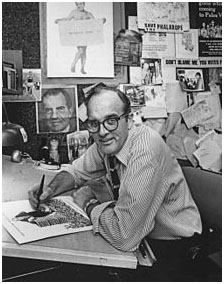

Paul Francis Conrad (June 27, 1924 – September 4, 2010) was an American political cartoonist and winner of three Pulitzer Prizes for editorial cartooning. In the span of a career lasting five decades, Conrad provided a critical perspective on eleven presidential administrations in the United States. He is best known for his work as the chief editorial cartoonist for the Los Angeles Times during a time when the newspaper was in transition under the direction of publisher Otis Chandler who recruited Conrad from the Denver Post.
At the conservative Times, Conrad brought a more liberal editorial perspective that readers both celebrated and criticized, but also respected for his sheer talent and his ability to speak truth to power. On a weekly basis, Conrad addressed the social justice issues of the day—poverty in America, movements for civil rights, the Vietnam War, the Israeli–Palestinian conflict, and corporate and political corruption were leading topics. His criticism of president Richard Nixon during the Watergate scandal landed Conrad on Nixon's Enemies List, which Conrad regarded as a badge of honor.
He earned the Pulitzer Prize for Editorial Cartooning three times, once for his work at the Denver Post in 1964, and twice more for his work at the Los Angeles Times in 1971 and 1984. The Society of Professional Journalists/Sigma Delta Chi (SDX) honored him seven times with the Distinguished Service Awards for Editorial Cartooning in 1962, 1968, 1970, 1980, 1981, 1987, and in 1996. Conrad also won two Overseas Press Club awards (1981 and 1970) and received the Robert F. Kennedy Journalism Award four times, in 1985, 1990, 1992, and 1993. He received the Lifetime Achievement Award from the Association of American Editorial Cartoonists in 1998, and the Lifetime Public Service Award from The Edmund G. "Pat" Brown Institute of Public Affairs at California State University, Los Angeles in 2000.
As an editorial cartoonist who openly editorialized from a liberal point of view on the issues of the day, Conrad was involved in many publicized political and religious disputes with the public over his cartoons:264–5 In one dispute, he angered conservatives when he compared them to white supremacist Buford Furrow in a cartoon. Conrad's cartoons often made fun of the governorship of Ronald Reagan, leading his wife, Nancy Reagan, to phone publisher Otis Chandler and complain about how the cartoons were ruining her husband's breakfast. The calls were so frequent, Chandler had no choice but to stop taking them. In another dispute, members of the Jewish community of Los Angeles took issue with Conrad's portrayal of the Israeli–Palestinian conflict. 9–10.
In the late 1970s, Pope Paul VI expressed his opinion against the ordination of women saying that priests must represent the image of Christ. This led Conrad to draw a cartoon of the pope holding a baby who resembled a miniature version of the pope in his image. Cardinal Timothy Manning complained to Conrad, but Conrad defended his work arguing that what the "human soul" has in common is far more important that its appearance in the form of a man or woman.Conrad also criticized the Catholic church for not letting priests marry and for treating their nuns poorly. "This is the type of church Christ had in mind?" he asked the National Catholic Reporter in 2001.



















